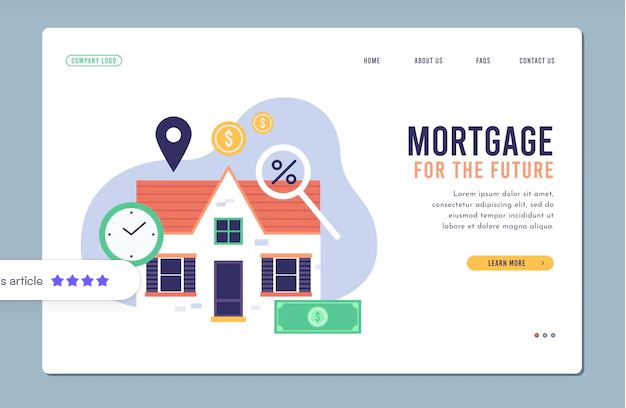The Most Common Mortgage Mistakes You’re Making and How to Avoid Them
Finding the right mortgage is no easy feat. There are so many variables that can and will change over the life of your loan, from interest rates to the type of benefit you qualify for. If you’re anything like us, you might have been hesitant to take on another loan in the past, especially since you already have a pre-established budget and credit score that’s solid enough to get a loan in the first place. But with so many regulations and changes today, it’s even more important than ever to understand exactly what’s going on before making any big decisions. The bottom line is this: You need a stable source of income to build wealth and avoid becoming one of those “credit card debt slaves” that every financial advisor warns about. It may feel like there are too many variables these days when it comes to getting a mortgage, but by understanding how common mortgage mistakes you’re making and how not to make them, you can rest assured that getting a mortgage is one of the easier loans you can obtain. Here are some of the most common mortgage mistakes people make and how not to make them:
Getting a mortgage despite a bad credit score
Some people worry about getting a mortgage even when their credit is strong. While it’s always helpful to have a solid credit score to start the process, the fact is that banks use a wide range of criteria to decide whether or not a borrower will get a loan. So, while your credit score may determine whether or not you get approved for a loan, it has nothing to do with whether or not they end up honoring the loan. Banks make money off of loans, and they have to figure out how to make the most profit from them. If they have to put up more cash upfront to cover your loan, then they’re less likely to approve the loan and you’ll be responsible for the difference. It may seem like banks are lending more these days, but remember: More money in your account doesn’t always mean more loans. So, even if your credit score is solid, you may not be able to get a mortgage if you’ve got bad credit. In which case, you’re in trouble. Put differently, you’re probably going to end up with a high-interest rate, a smaller loan and no benefit from the reduced interest rates that low credit scores can bring about.
Lending money to family members
One of the most common mortgage mistakes people make is lending money to family members. First off, you don’t need to put up collateral when lending money to family members. Just make sure they have a good credit score and can pay you back if something goes wrong. This means looking at family members as either co-borrowers or shareholders. Second, be very careful about extending the term of your loan. It’s one thing to say you’ll pay off the loan in your lifetime, but we recommend having the plan to pay it off quickly. If you can’t make it through your monthly bills, then a large portion of your loan could fall into default and you could lose your house.
Facing high-interest rates for an aggressive mortgage payment plan
Some people think they can get away with paying high-interest rates on a mortgage, but that’s not the case. Credit score improvements and new loan terms can sometimes be used as a reason for lowering your interest rate, but there are very few circumstances where you can get away with paying high-interest rates. If your rates are jacked up because you’re facing an aggressive mortgage payment plan, then you need to shop around and find a more reasonable lender.
Getting a loan that’s too small for your property value
Another common mistake people make is trying to get a loan that’s too small for their property value. This is a huge no-brainer, right? Sure, you may qualify for a loan that’s too small for your property value if you bought a fixer-upper, but you’re essentially taking a chance by doing so. In most cases where you get a loan that’s too small for your property value, you’re putting yourself at a disadvantage. A loan that’s too small for your property value will end up being much, much harder to repay. It will likely fall into default, which means you could lose your home. Avoid getting a loan that’s too small for your property value by checking your credit score and making sure it’s above 350.
Not understanding how all of your benefits affect your mortgage payments
Many people don’t realize that all of the various benefits you receive when you have a mortgage also have to be taken into consideration when calculating your monthly mortgage payment. This can sometimes lead people to qualify for a loan that they don’t need and that they may not be able to repay. For example, let’s say you qualify for a loan that provides you a percentage of the value of the house you’re buying. If the house is worth half of what you owe on the loan, then you’re only getting half of the benefit from the loan. If, however, the house is worth two times as much as you owe on the loan, then you’re getting two times the benefit from the loan. This is a hard one because every scenario is different, but you get the point. Every benefit you receive has to be factored into your mortgage calculation.
Making changes to your loan without getting approval first
Another common mistake people make is to make changes to their loans without first getting approval from a lender. This is a huge no-brainer, right? Yes, of course, but it’s also one of the most common reasons why people with bad credit scores get rejected for a loan. There are specific steps you need to take to make sure that you’re actually making changes to your loan and not just trying to save a few bucks. If you’re simply cutting a feature or changing a component, then you won’t be making a change and may be able to get away with it, but as soon as you’re trying to save money on something, you need to get approval first. Depending on how flexible your lender is, there’s a chance you could walk out of the financing room with your mouth still open in shock at what you just signed papers for.
Summing up
The final common mistake people make when getting a mortgage is not reading the fine print. There are so many details to take in when you’re first getting started that it’s easy to miss something. The less-than-perfect credit score you have, the more complicated the loan process will be for you. But remember, the more information you have, the easier it will be to correct your mistake and get approved for a loan. So, the next time you’re at the loan window and are wondering what to buy, just remember: There are no Mister Rogers’ mortgages.
Learn more about How to Shop for Infinity Insurance and Get the Coverage You NEED.



